
Surah Al-Ala is a Meccan Surah with nineteen verses. Al-Ala means The Most High. The Surah takes its name from the word al-Ala in the very first verse.
The subject matter shows that this too is one of the earliest Surahs to be revealed, and one of the verse of this Surah: “We shall enable you to recite, then you shall never forget” indicates that it was sent down in the period when the Messenger pbuh was not yet fully accustomed to receive Revelation and at the time Revelation came down he feared lest he should forget its words.
This short surah contains three themes:
➖Tawheed
➖Instructions to the Prophet pbuh
➖Hereafter
Firstly the doctrine of Tawheed has been mentioned and the primary thing is that Allah Almighty should be remembered only by the beautiful names which suit and befit Him. And it goes on further how perfectly Allah created all the things.
Then the Prophet pbuh has been adressed and consoled that it is Allah who will help His Messenger retain the Quran and the revelations, he shouldn’t be worrying about it.
Then, the Prophet pbuh has been told: “You have not been made responsible to bring everyone on to the right path; your only duty is to convey the truth, and the simplest way of conveying the truth is that admonition be given to him who is inclined to listen to the admonition and accept it, and the one who is not inclined to it, should not be pursued.”
The discourse has been summed up, saying: “Success is only for those who adopt purity of belief, morals and deed, and remember the name of their Lord and perform the Prayer. But on the contrary, the people who are wholly lost in seeking the pleasures of the world are in loss. As the Hereafter is far better than the blessings of this world. This truth has not been expressed only in the Quran but in the books of the Prophets Ibrahim and Moses too, it had been brought to the notice of man.
WHAT ARE AL-MUSABBIHAAT SURAHS?
Surah Al-Ala is also from Al-Musabbihaat….!
Surah Al-Ala was one of the favourite surahs of the Prophet pbuh. There are a number of surahs in the Quran called Al-Musabbihaat; these are the surahs that begin with the declaration of the perfection and glory of Allah.
They either begin with:
1) Sabbaha lillahi – The perfection of Allah is being declared by all creations in the past tense (e.g. Surah As-Saff, Al-Hadeed, Al-Hashr)
2) Yusabbihu lillahi – The perfection of Allah is being declared by all creations in the present and future tense (e.g. Surah Al-Jum’ah, At-Taghabun)
3) Subhaana – The perfection of Allah is declared in the infinitive form, a permanent and timeless perfection in noun form (e.g. Surah Al-Israa’)
4) Sabbihi – A command to declare Allah’s perfection (e.g. Surah Al-Ala)
Of all the musabbihaat, this is the most beloved to the Prophet pbuh, for a number of reasons. One of them is evident in the Sunnah itself in that he pbuh would love to recite this specific Surah in every Jum’ah prayer and in both of the Eid prayers. And this is also a Sunnah to recite this Surah in the first rakah of Witr prayer.
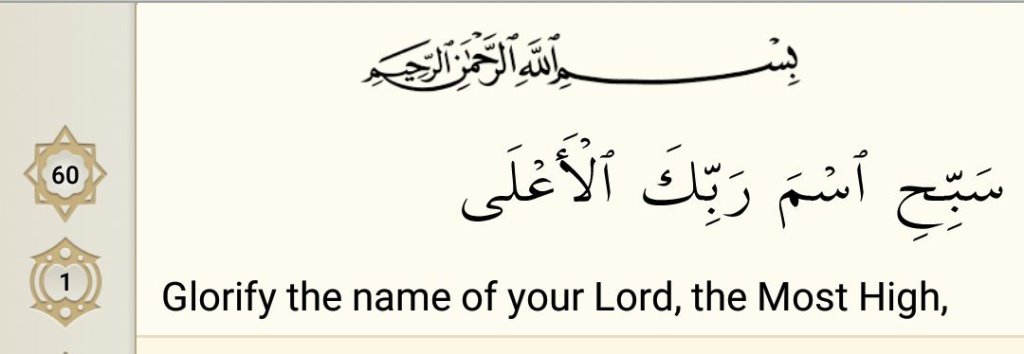
The Messenger pbuh has been commanded to declare the perfection of the name of his Lord, the Most High specifically and there’s a general command for all.
“Purify the name of your Lord, the Highest.” This can have several meanings and all are implied:
(1) Allah should be remembered by the names which fit Him, and no such name should be used for His exalted Being which with regard to its meaning and sense, does not fit Him, or which reflects some aspect of deficiency, lack of reverence, polytheism about Him, or which refers to some wrong belief in respect of His Being, attributes, or works. For this purpose, the safest way is that only such names be used for Allah, which He himself has mentioned in the Quran, or which are a correct translation of these names in other languages.
(2) Allah should not be remembered by the names as are used generally for the created beings, or the created beings should not be called by names as are specifically meant for Allah.
(3) Allah should not be mentioned in a way or in a state which reflects lack of respect for Him, e.g to mention His name when engaged in mockery or jest, or when in the lavatory, or while committing a sinful act, or before the people who might behave insolently in response or in gatherings where the people are engaged in absurd things and might laugh off His mention, or on an occasion when it is feared that the hearer will hear it disdainfully.
About Imam Malik, it is related that when a beggar begged him for something and he did not have anything to give, he would not turn away the beggar, saying that Allah would help him, as is commonly done by the people, but he would excuse himself in some other way. When asked why he did so, he replied: “When the beggar is not given anything and one makes an excuse, it inevitably displeases him. On such an occasion, I do not like to mention Allah’s name, for I do not like that somebody should hear His name in a state of annoyance and displeasure.”
The word Sabih comes from the word Tasbeeh. Tasbeeh is to declare or remember Allah with a certain profound remembrance that Allah Himself has taught. Tasbeeh comes from the word sibaaha, which means to swim. In Arabic, there are different words used for swimming, but this word in particular refers to a type of swimming where you don’t go under water and maintain your level above the water and is close to the concept of floating. When something floats it retains its level and refuses to go down. Thus, Allah is beyond any imperfections and is perfect and we are to not say anything about Him that brings that level down. Tasbeeh is to acknowledge His perfection in the things we say about Him.
And ultimately He is ‘the Most High’ . It points to the fact that He is High and the Most High to any other persons or things that can be thought of, or beyond any apparent idolatrous or hidden polytheism.
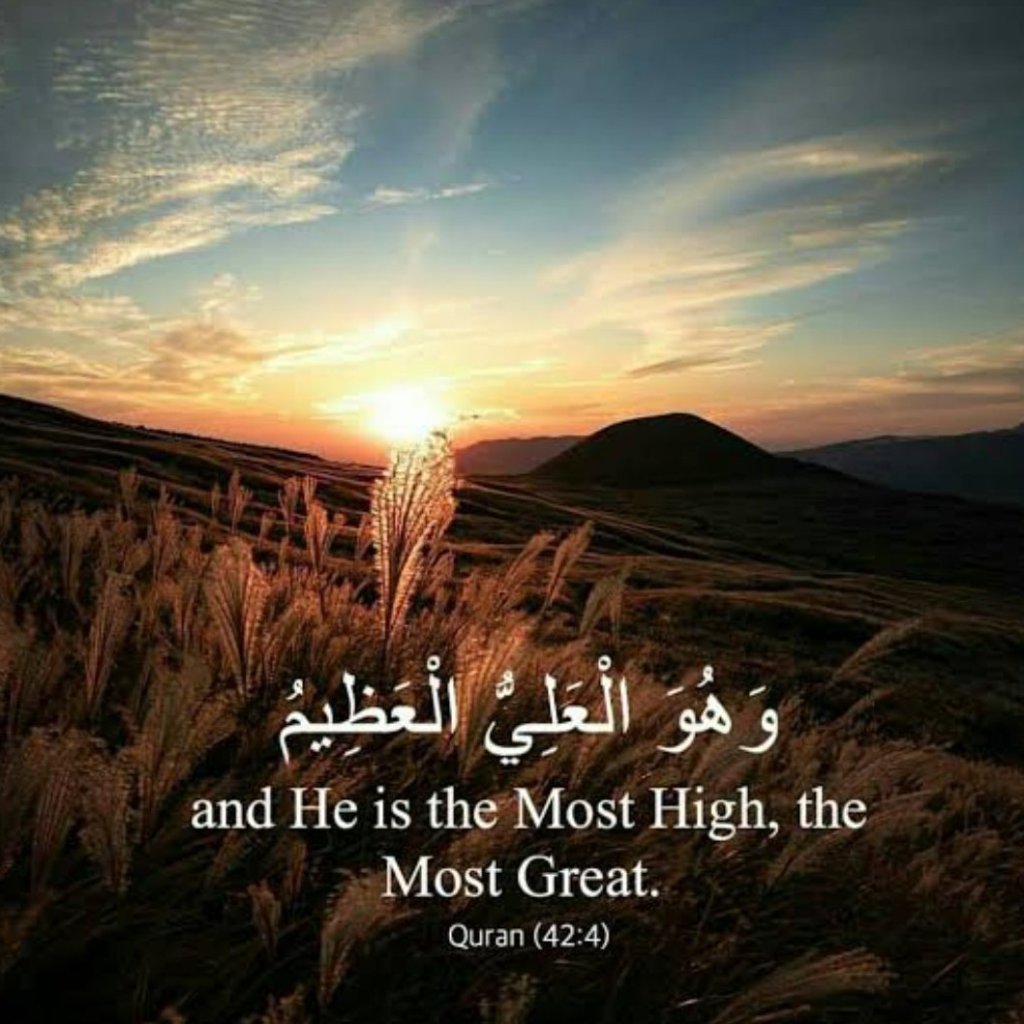

After glorification of Allah’s name and his Lordship us mentioned, now the first thing we should know is that He created! Most of humanity acknowledge a divine being that created but refuse to accept that He is their Lord. They will refuse to make that leap and accept that they are enslaved to this higher power and that it has rights over them. Allah mentions first His name that establishes rights over us (rabbik) and then secondly His power to create is mentioned. There is no other rabb like Him and no other master has the power to create. All other masters at the most have the power to own and control but they themselves are created and are unable to create anything. Thus, Allah is unique because He created everything and then perfected and fashioned it.
He created everything, from the earth to the heavens, in the universe, and gave whatever he created the right proportion and balance and gave every creature the best conceivable form and shape. The same thing has been expressed in Surah As-Sajdah, V:7,
“Who gave everything He created the best form”
Thus, the creation of everything in the world giving it due order and proportion, is an express sign of the truth that some Wise Designer is its Creator. Had the creation of the countless things in the universe been the result of a chance accident, or the work of many creators, there could be no order and balance, no beauty and inner coherence among the many things existing in the world.
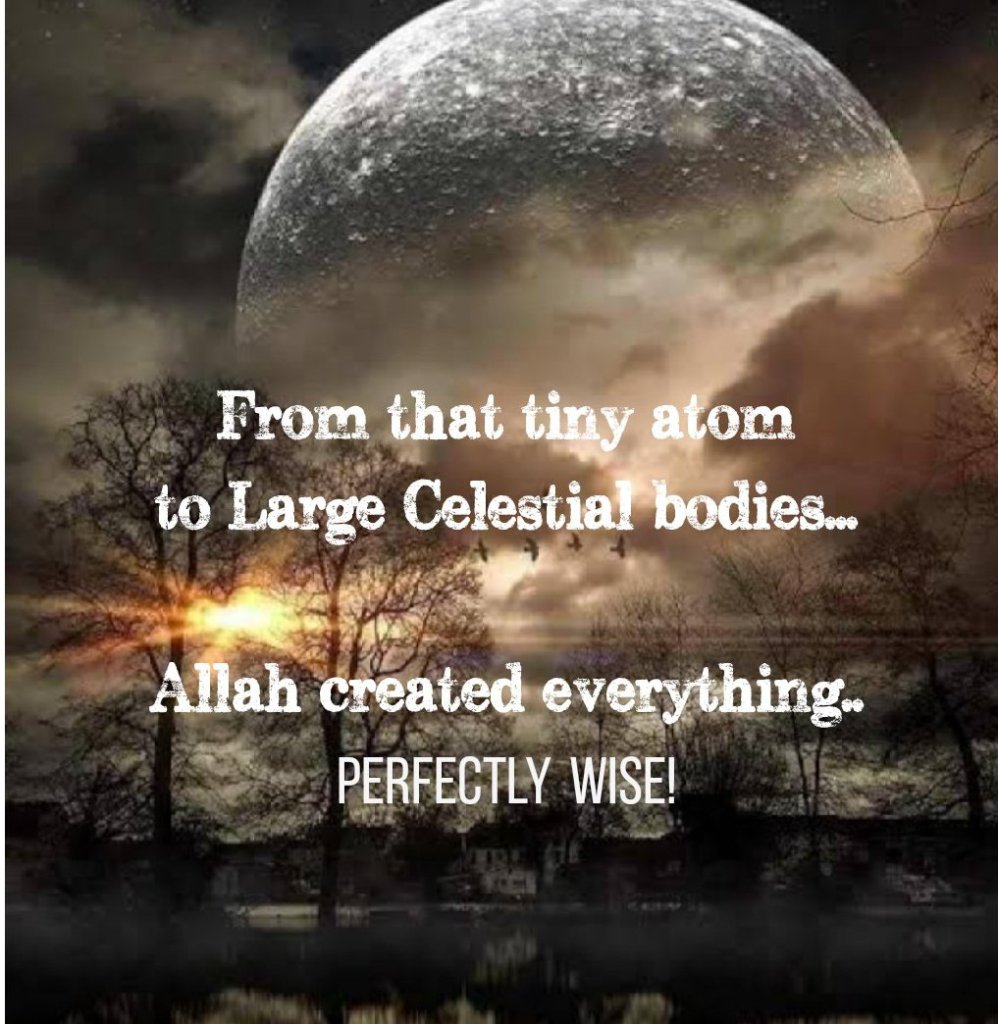

Another two attributes of Rabb are now given i.e Lord who determined and then guided. Qaddara is to calculate and to have an exact and precise plan of action for something. Allah set a destiny for everything, He determined beforehand what would be the function of a certain thing in the world, and for that purpose what would be its size, its form and shape, its qualities, its place of location, and what opportunities and means should be provided for its survival, existence and functioning, when it should come into being, and when and how it should cease to be after completing its part of the work. Such a scheme for a thing is its “destiny” (taqdir). And this destiny Allah has set for everything in the universe and for the entire universe as a whole. This means that the creation has not come about without a pre-conceived plan, haphazardly, but for it the Creator had a full plan before Him, and everything is happening according to that plan.
He is not merely the Creator but Guide too. He has taken the responsibility to give guidance to whatever He has created in a particular capacity to fit its nature and to guide it in the way suitable for it. That is, nothing was just created and left to itself, but whatever was created to perform a certain function, it was also taught the method of performing that function. In other words, He is not merely the Creator but Guide too.
Two types of guidance…
The first type of guidance is the Inbuilt guidance for example, the earth, the moon, the sun, and the stars and planets, which they are following in performing their role, how our body organs work without us even supervising it, how all natural habitat knows what to do etc.
The second kind of guidance is the Revealed guidance for man’s intellectual and conscious life, the nature of which is absolutely different from the guidance for unconscious life. This guidance is what the messengers of Allah brought to mankind. For turning away from this last kind of guidance, man may offer whatever arguments and excuses he may like, it is not credible that the Creator Who has arranged guidance for everything in this universe according to its capacity, might have set for man the destiny that he may appropriate numerous things in His world freely, but might not have made any arrangement to show what is the right way of using his choice and what is the wrong way.
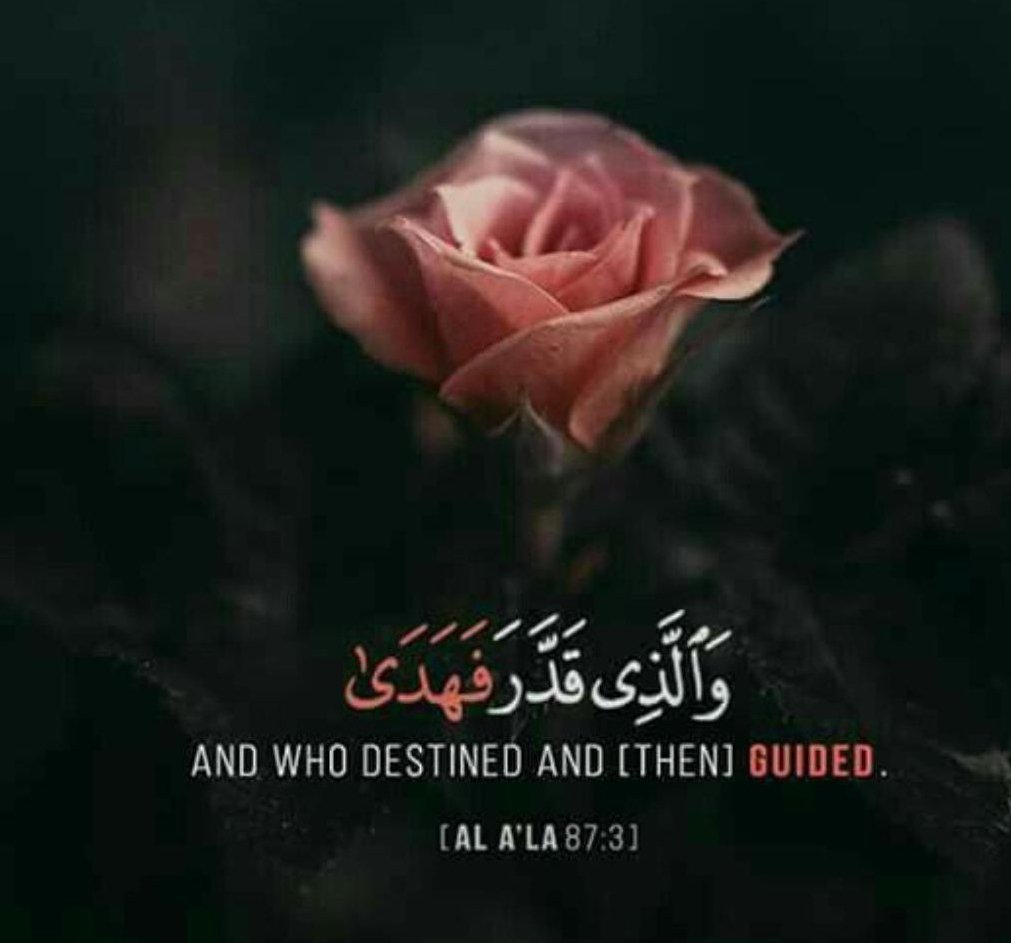
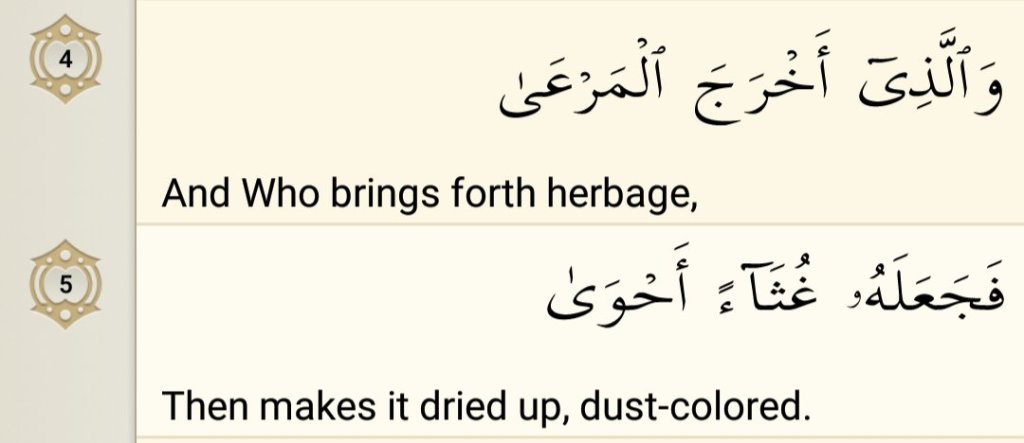
Now Allah gives an example of His creative process that how Allah draws life out of the earth. Akhraja means to extract or pull out and mar’a means to pasture in order to feed animals, also it is a place of a lot of greenery where animals graze and is perfectly suited to sustain certain animals. Allah is referring to this as an example of his perfectly calculated plan where animals are provided for. The context shows that here it does not imply mere fodder but every kind of vegetation that grows out of the soil.
Allah is then contrasting how He creates and then destroys that very same creation and creation in general; a few weeks ago it was mar’aa and now it is ghuthaa’an ahwaa.
Ghuthaa means either it is waste like dead, rotten leaves that naturally gather together or it is when plants that are not necessarily rubbish grow in a cluster next to each other. And ahwaa means to bring two things together and is also for something to become black and red at the same time. Like the vegetation turning bad and black. Thus the verse is talking about the best of the plantation subsequently being destroyed, then it is a comparison of the temporal, transient nature of this life and of how the joys of this life ultimately wither away.
It also implies that Allah does not only bring about spring but autumn as well. You witness both the manifestations of this power. On the one side, He causes lush green vegetation to grow, the freshness of which pleases the hearts and, on the other, He renders the same vegetation pale, dry and black rubbish, which is blown about by winds and swept away by floods. Therefore, no one here should be involved in the misunderstanding that he will only experience spring and will never see autumn.

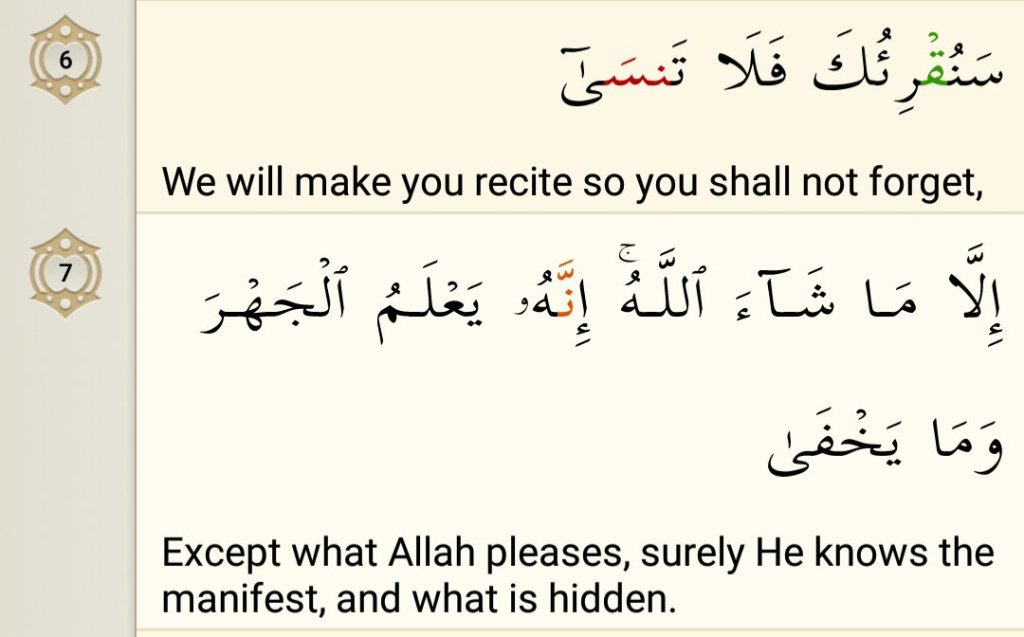
The Prophet pbuh was much concerned that he might forget the Quran which was revealed to him and was also deeply concerned that he will not live up to the demands of the revelation and the mission Allah has given him. That’s because he was very conscious of the fact that he was carrying in his heart the Divine message of salvation for the entire humanity, for all upcoming generations till Akhirah. He pbuh had this immense sense of responsibility and one of the things that was nerve-wrecking to him was the thought that he might forget even a piece of it. This concern occurs in three places of the Quran and this is the third of them.
The Prophet pbuh repeated the words revealed to him for fear lest he should forget them. Even before Jibreel a.s finished recitation of the Revelation the Prophet pbuh would start repeating the initial verses lest he should forget them. On this very basis Allah assured him that he should listen quietly when the Revelation was coming down, because it is Allah Alone who will enable him to recite it and he will remember it for ever. He should have no fear that he will forget any word of it.
This is the third occasion where the Prophet pbuh has been taught the method of receiving the Revelation. This verse proves that just as the Quran was sent down to the Prophet pbuh as a miracle, so also its each word was preserved in his memory as a miracle and no possibility was allowed to remain that he should forget anything of it, or that he should utter another synonymous word for any word of it.
Except what Allah wills. He knows what is apparent and what is hidden
This verse can have two meanings:
➖ That the preservation of the entire Quran word to word in Prophet’s pbuh memory is not a manifestation of his own power but the result of Allah Almighty’s bounty and grace; otherwise if Allah so willed, He could cause it to be forgotten.
➖ Prophet pbuh forgetting something temporarily, or forgetting a verse or a word occasionally is an exception froth this promise. What has been promised is: `You will not forget any word of the Quran permanently’. This meaning is confirmed by the following tradition of Bukhari:
Once while leading the Fajr Prayer the Prophet pbuh happened to omit a verse during the recitation. After the Prayer Hazrat Ubay bin Kaab asked if the verse had been abrogated. The Prophet pbuh replied that he had forgotten to recite it.

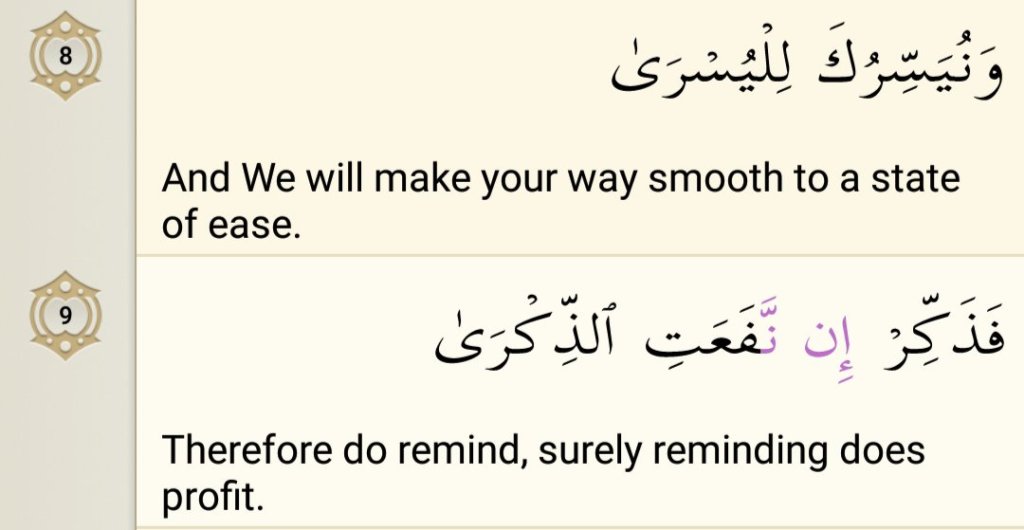
In this verse Allah has guaranteed that the struggles of the Prophet pbuh will be made miraculously easy for him by Allah’s intervention. Just as Allah took on the task of preserving the Quran, which the Prophet pbuh thought would be difficult for him to remember. The second struggle is his struggle in the dunia, the Dawah and Message he has to convey to all mankind. After consoling the Messenger pbuh on the Quran, Allah guarantees that He will make ease for him all this process.
Then Allah instructs the Prophet pbuh to remind people as reminder does benefit especially those who are inclined towards it and in general to all. It’s like Allah saying O Prophet! We do not want to put you to any hardship concerning the preaching of Islam by demanding that you should compel the deaf to hear and the blind to see the way, but We have appointed an easy way for you, which is this: Give admonition when you feel that the people are inclined to benefit by it. As to who is inclined to benefit by the admonition and who is not, this you can only know through general preaching, which is Prophet’s pbuh main task. Therefore, you should continue your general preaching, but your object should be to search out those from among the people who will benefit by it and adopt the right way. Such people alone are worthy of your attention and you should pay full attention only to their instruction and training. You need not abandon them and pursue those about whom you find by experience that they are not inclined to accept any admonition. As Allah says in Surah Abasa (V: 5-12),
“As for him who is indifferent, to him you attend, though you would not be responsible if he does not reform. And the one who comes to you running, of his own will and fears, from him you turn away. By no means: This is but an Admonition. Let him who wills, accept it.”
In general, reminding others is an activity itself that carries benefits whether you see the results of it or not. The Prophet pbuh was told this, as he would get very upset when people would not listen to the message. Allah instructs him not to worry about anything else and to just remind.
When we give someone a reminder, their ego may prevent them from accepting what we say or maybe our message only sinks in once they have had time to process it. Thus, we should not judge people as they may accept later what we are saying and also their reluctance to accept our reminder should not deter us from talking to them. As Allah has not given anyone the license to see inside anyone’s heart and so we cannot pick and choose who we spread Islam too. This reminder can benefit anyone, so much so that even Firoun is sent a reminder and no judgment is passed on him until he himself makes a decision to deny. We just have to deliver, detect the inclined ones and work hard on them to extract ultimate benefit!

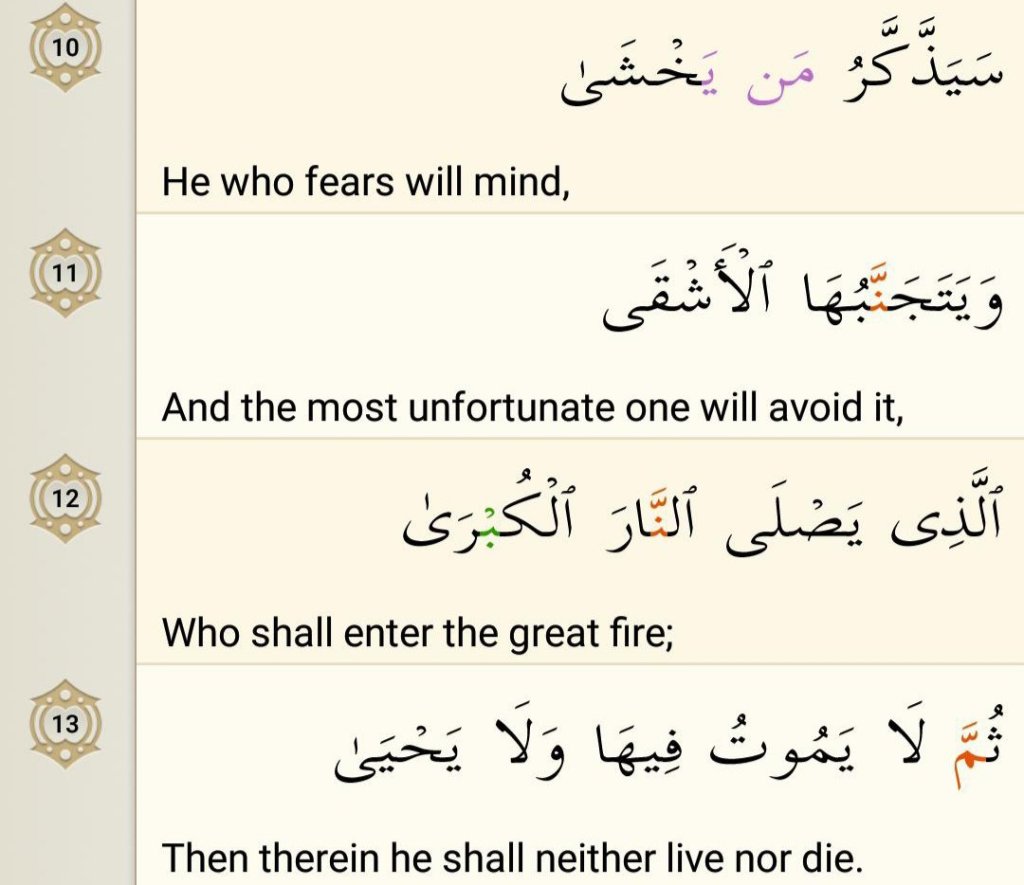
Allah already told the Prophet pbuh that he can only remind people but who will benefit from this reminder and who will avoid it? Now it talks about such mindsets. Allah says the one who fears will accept the reminder. Khashiya is to fear something greater than yourself or that has power to overcome you and Allah is saying that whosoever has fear will make an effort to remember.
The word ashqaa comes from shaqiya and means to be unfortunate. This most unfortunate person who surrounds himself with evil company and wastes his life away will make great efforts to avoid the message and reminders of Islam. He will think that the people who accept this message are unfortunate but, as Allah has described, the reality is that he is the most unfortunate. Such a person will always remain at a distance from Allah’s words.
And as a consequence, the final destiny of this person is HellFire. Just like this person made a plan to stay away from the reminder, Allah has made a plan for him to cast his ownself into the hellfire. Yaslaa means that this person will throw himself into hellfire; his limbs will rebel against him and cast themselves into the fire. And now he will be in the most unfortunate situation, being punished forever and no death will approach him. One of the fearful thing about Hell is that one would wish for death to escape the pain but it will not occur. Allah says in Surah Ibrahim (V:17):
‘…and death will come to him from every side, yet he will not die…’
With regards to reminding others, people are divided into three groups in this respect:
1) those who are aware and knowledgeable,
2) those who hesitate and stand in doubt,
3) and those who are the enemies of Truth.
It is natural that the first and the second groups derive benefit from admonitions, but, for the third group the admonition is useless. The only thing that can be mentioned about them is that admonition is useful to complete the argument and as a reason for them to be warned.

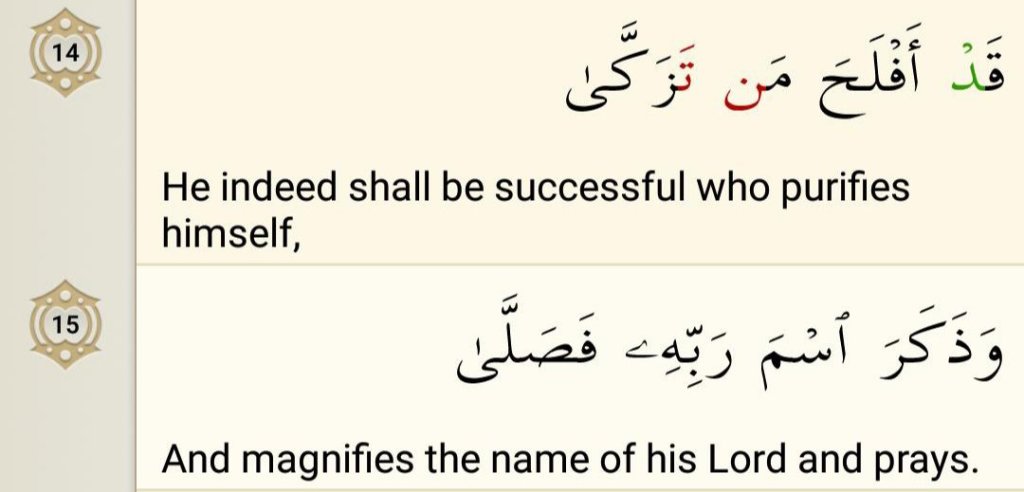
Now Alllah says the one who has purified himself is successful indeed. The one who has done tazkiyah, the one who affirmed the faith giving up disbelief and polytheism, adopted good morals and gives up evil morals, and performed good deeds giving up evil deeds. Success does not imply only worldly prosperity, but true and real success is whether worldly prosperity accompanies it or not, and the one who struggles for his Akirah to be successful! Whosoever engages in the act of trying to cleanse themselves from within and tries to become a better person has already succeeded.
Such a person would remember Allah a lot. To remember Allah signifies His remembrance in the heart as well as with the tongue.
Such a person would not just remain content with remembering Allah but proves it by performing the Salah, that he is practically also prepared to obey Allah in Whom he has affirmed the faith, and will remember His name as long as he lives. So Salah is like proving how much faith and Allah matters to one, the more refined the Salah is in one’s life, the more sincerity it proves.
The bottom line of this Surah is to look inside yourself and to find some good so that you can harvest it and let it flourish. The people who are concerned with purifying themselves have attained the ultimate success because right now they have the right concern and attitude and this surah is all about changing attitudes.

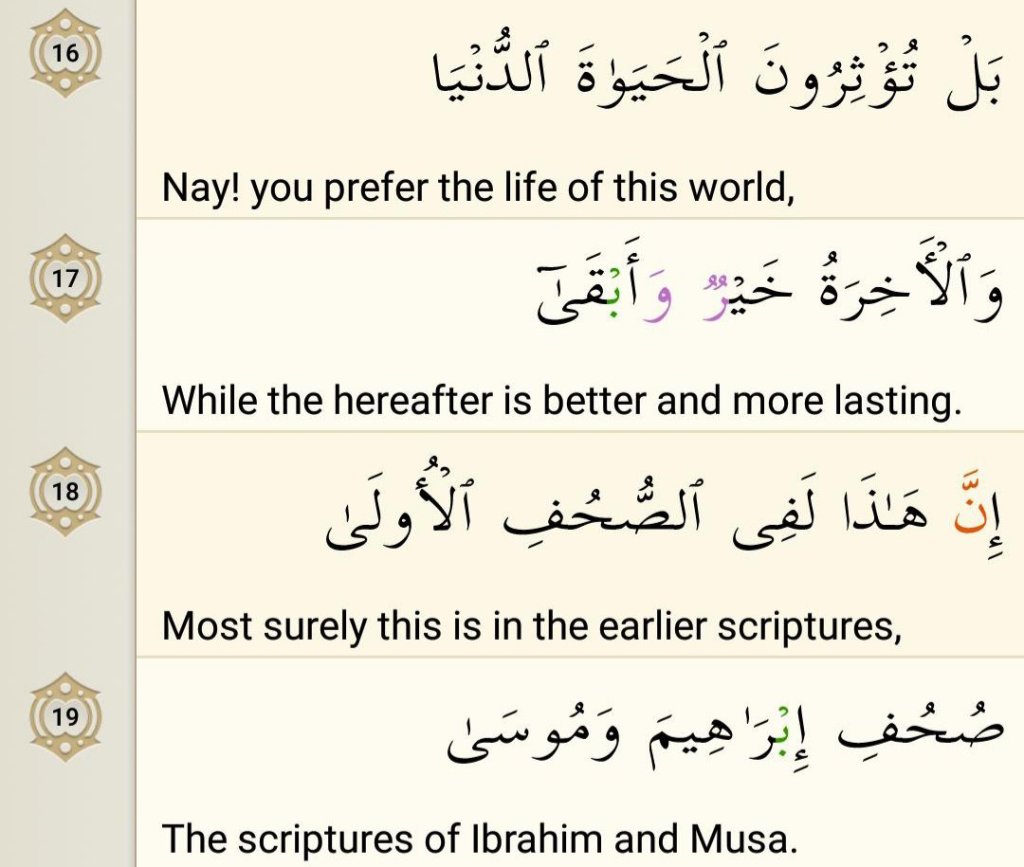
Allah is now telling what keeps humanity from finding the true success. Every person has a self-defined meaning of success for which they strive throughout their lives. Allah straight away tells man that you give preference to the life of this world and consider it place for success while the real success is that of Hereafter.
Atharaa is to compare two things and to decide that one is more valuable than the other and so you give it more time, preference and priority. The word dunia is form the word adnaa which means closer and inferior to. Allah calls this worldly life inferior and closer to you as you get things right away. So man takes preference of the immediate pleasures in front of him over the distant pleasures that Allah has prepared, of Jannah!
Allah gives two comparisons and convinces us of the better nature of the Akhirah by letting us know that anything we can get in this life will be better and everlasting in the next. Akhirah is like believing in something that you cannot see. You have to believe in it and your imaan in the Akhirah is tested with your preference. We can say we prefer Allah, the Deen and that we live our lives for the sake of Allah. However, Allah knows what is obvious and what is hidden and whether our preferences are headed in a different direction, how we spend our days and what we dedicate our time and effort to. We have to look deep in ourselves to find the answer to this question and ask ourselves if we are truly giving preference to the next life over this one.
Earlier scriptures, like the scriptures of Ibrahim a.s and Moosa a.s have also declared that the Akhirah is better and longer lasting than this dunia and have also called people to declare the greatness and acknowledge the perfection of the name of their Lord, the Most High. If one can understand this concept then they have got the essence of every Messenger’s message. Allah highlights mention of these two Prophets because they were very well known to the Arabs that time.
This Surah covers all three imaaniyyaat. Belief in Allah and His perfection is covered in the beginning of the Surah. The revelation is covered in the middle of the Surah and the Akhirah is covered at the end.
